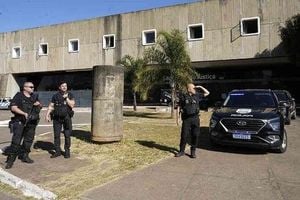Concerns are rising among U.S. lawmakers about the growing influence of the Chinese Communist Party (CCP) within the United States, particularly through cultural and legal channels. The recent performance of the National Ballet of China at the Kennedy Center has triggered intense scrutiny, with officials claiming the dance company serves as part of the CCP's broader propaganda machinery.
On January 24, two U.S. lawmakers, including the chairman of the House Select Committee on the CCP, sent a letter expressing their dismay over the Kennedy Center hosting the ballet. They condemned the company, stating it is leveraged by the Communist Party to spread its influence abroad. "Art is often manipulated by the regime to present a friendly face to American audiences, all the whilst engaging in persecution against dissenting artists at home," the lawmakers noted. The letter highlighted connections between the ballet’s officials and the Communist Party, claiming, "Three of the five leaders of the National Ballet of China are Party members. Director Feng Ying has direct ties to the National People’s Congress, where members are often selected by the Party," they argued.
Moving beyond cultural influence, recent reports highlight the establishment of covert legal operations by China on U.S. soil. According to investigations, several nonprofit organizations associated with the CCP have allegedly set up unofficial courts across the U.S., including locations like California and New York, to impose Chinese laws and policies. This alarming discovery, made public on January 30, reveals how these organizations share intelligence with Chinese authorities and may even engineer forced repatriation of dissidents.
Michigan Republican Rep. John Moolenaar called this imposition of China’s legal system on American soil a "direct assault on U.S. sovereignty and the rule of law." He declared, "These actions endanger the freedoms of Chinese Americans and threaten the principles of justice in our nation.” The investigation also points out how these entities are linked to the United Front Work Department, which is known as the CCP's intelligence agency.
Further amplifying the alarm, experts recently reported to Congress about the extensive influence operations orchestrated by China. A Senate Foreign Relations Committee hearing revealed alarming practices whereby the CCP allegedly recruits U.S. university professors, corrupts local officials, and engages in cyber activities to shape public opinion and political policies.
One expert, Jennifer Lind from Dartmouth College, underscored the scale of these operations, estimating the annual funding for such initiatives to range between $3 billion to $8 billion. She stated, "China is engaged in expansive hostile operations to bolster its regime, discredit democratic systems, and shape global norms to align with its interests." Lind emphasized the need for U.S. officials to respond proactively, indicating, "Washington must convey to Beijing its limits through counter-influence strategies." She suggested America could conduct operations aimed at unsettling the stability of the Chinese government, something the CCP fears deeply.
Similarly, former State Department official Melanie Hart pointed out the increasing ideological rivalry, insisting China’s influence is not mere political finesse but rather constitutes an outright threat to democracy. Hart expressed concerns over the shutdown of the State Department’s Global Engagement Center, which was pivotal for countering foreign disinformation, stressing, "We need the tools to engage in full-spectrum competition against Chinese subversion."
The coordinated series of warnings and testimonies highlight the need for the U.S. to consolidate efforts to counteract the extensive reach of Chinese influence. Chairman of the Senate Foreign Relations Committee, Jim Risch, articulated the urgency behind legislative measures aimed at closing loopholes enabling foreign agents from conducting lobbying activities.
"Chinese officials have worked systematically, often resorting to bribery and deceit, to dominate their global standing, and we must stop them," Risch asserted, indicating bipartisan support to address the challenge posed by the CCP.
Meanwhile, Senator Jeanne Shaheen reiterated the bipartisan consensus, stressing the necessity for American societies to fortify themselves against the growing influence exerted by Beijing. She warned, "China is strategically targeting our open society with every tool at its disposal and it is pivotal we arm ourselves with more resources to counteract their ploys."
From cultural performances to covert legal operations and comprehensive influence campaigns, it is evident the CCP's footprint is broadening inside the U.S. Lawmakers and experts are rallying for more consolidated protective measures against these influences. The question remains: what steps will be taken to safeguard American institutions and values from foreign interference?



